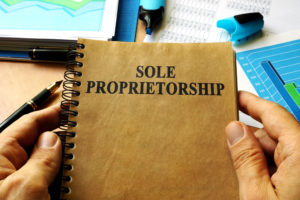Howard County, MD, Sole Proprietorship Lawyers

One of the advantages of having sole proprietorship is that you do not file separate taxes for your business; you report all of your business income and losses on your personal income tax return.
What Goes into the Formation of a Sole Proprietorship?
You do not have to take any formal action to form a sole proprietorship. You are the sole proprietor as long as you are the only owner. The status of being a sole proprietorship automatically arises from your business activities. You are a sole proprietor if you are in business and do not have a business entity.
A sole proprietor must obtain the necessary licenses and permits like all businesses. Regulations vary by industry, State, and locality. At the Coover Law Firm, our attorneys can help you acquire all state, county, and local permits, licenses, and registrations you need to run a business.
Registration of a business name for a sole proprietor is generally uncomplicated unless it involves the selection of a name that is fictitious or “assumed.” The business owner must register with the appropriate Maryland authorities, who will determine that another business entity does not currently use the name submitted. The business owner must also complete and file a Trade name application with the State.
Taxation of a Sole Proprietor
One of the advantages of a sole proprietorship is its simplicity. You do not report business income on separate tax returns for your business; you report all of your business income and losses on your personal income tax return. It is always wise to seek help from experienced accounting professionals when forming any business, including a sole proprietorship.
Since income from a sole proprietorship is taxed as personal income, the tax amount depends on your income tax bracket. The more income the business generates, the more personal income you have, and the higher your rate of taxation will be. However, certain business entities are taxed separately and at potentially lower tax rates than personal income. It is possible to pay less tax by forming a business entity than running it as a sole proprietorship.
For example, consider if your business made $200,000 in profits last year. A corporation would be taxed about 15% on the first $50,000 and then 25% on the remaining $150,000. As personal income, however, that same $200,000 most likely moves you into a tax bracket higher than 25%. In this example and many others, you would owe significantly more taxes as a sole proprietor than a corporation. On the other hand, you must consider whether or not the expenses of entity formation and tax preparation outweigh the advantages of the easier tax preparation associated with a sole proprietorship.
What Are Sole Proprietorship Advantages?
- Easy and inexpensive to form: A sole proprietorship is the simplest and least expensive business structure. Costs are minimal, with legal costs limited to obtaining the necessary license or permits and securing a business name.
- Absolute control: Since you are the sole owner of the business, you have complete control over all decisions regarding the company.
- Family Oriented: The IRS has an exception that a spouse may work for the sole proprietor and not file taxes as a partnership.
- Simplified taxation: You and the business are not taxed separately, making tax filing requirements for a sole proprietorship the most simple to satisfy. The tax rates for a sole proprietor are also the lowest of the business structures.
What Are Sole Proprietorship Disadvantages?
- Unlimited personal liability: Because there is no legal separation between you and the business, you can be held personally liable for the debts and obligations of the company. This risk extends to any liabilities incurred as a result of employee actions.
- Capital can be difficult to find: Sole proprietors often face challenges raising money. Because you can’t sell stock in the business, investors won’t often invest. Banks are also hesitant to lend to a sole proprietorship because of a perceived lack of credibility when it comes to repayment if the business fails.
- Absolute responsibility: The flipside of complete control is the burden and pressure it can impose. You alone are ultimately responsible for the successes and failures of your business.
The business entity structure chosen affects many aspects, including taxation, liability, governance, management and control, transfer of ownership, and more. Attorneys at the Coover Law Firm, LLC advise clients on their options and handle all aspects of business entity formation with the structure that meets their needs and goals.
For any business, commercial, or corporate legal matter in Columbia, Maryland, and surrounding areas, call the Coover Law Firm, LLC at 410-995-1100 or toll-free at 866-425-9555, or contact the firm online to discuss scheduling an appointment with our attorneys.

